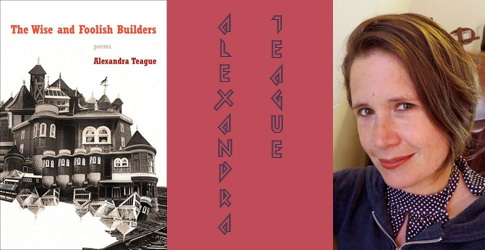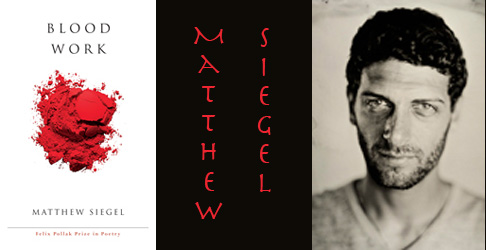Alexandra Teague and Matthew Siegel
Monday, May 25 at 7:30 PM
SPC at 1719 25th Street
Host: Tim Kahl
Alexandra Teague is the author of Mortal Geography (Persea 2010), winner of the 2009 Lexi Rudnitsky Prize and 2010 California Book Award Gold Medal in Poetry, and The Wise and Foolish Builders (Persea, April 2015)—which revolves around the story of Sarah Winchester, Victorian heiress to the rifle fortune. The recipient of a Stegner Fellowship, a National Endowment for the Arts Fellowship, and the 2014 Missouri Review Editors’ Prize, Alexandra has been published in journals including The Threepenny Review and The Southern Review. After years of teaching in the Bay Area of California, she is currently Assistant Professor of Poetry at University of Idaho.
Many a Goat
The imitative faculties of the. . .boy and his desire for glory
have been greatly stimulated by the coming of Buffalo Bill’s Wild West Show.
Many a peaceful dog has been roped. . . by urchins whose imagination
converted him into a bucking bronco; many a goat has been mistaken
for a rampant buffalo and hunted over imaginary Rocky Mountains.
—Brooklyn Eagle, 1894
A rowdy teenager named René Secrétan, who liked to dress up
in a cowboy costume he’d bought after seeing Buffalo Bill’s Wild West show,
was probably the source of the gun.
—New York Times Book Review, Van Gogh—The Life, 2011
Even here in Auvers, the boys are not immune
to the West’s wild lure. They buy drinks
for Van Gogh—send their girlfriends to taunt
with false seductions. Pretty peasants,
innocent prostitutes: the imagination turns
cotton to silk, cornflower blue into the red-
striped candy of garters; farmyards into Hell-
on-Wheels towns that roll behind rail crews
like a dark flock of crows. Van Gogh understands
this: mountains spiring through cornstalks,
snow capping the summer fields: lead-white
in a swirl of sunflowers. Many a peaceful dog
would rather be a bronco. Many a boy,
a canvas. Broken sky. The meringue
of prairie schooners. The imaginary plains
where guns gleam, pistol-twirled stars above
cypress. Many a tree would rather be a church
steeple. Many a church steeple: fire’s scorch
and gutter through the thatches of men’s
hearts. Maybe it’s true he steals the pistol—
antique, likely to malfunction—holds it
angle-askew in the field: a brush to swathe
the wound of a body. Maybe it’s true
the boys aim it. Their Dutch-Indian enemy,
innocent, inebriated: Yellow Bonnet’s
war paint and canvas: lodge poles of madness
holding up his mind. They’ve seen it all
before: blood on stage, and Bill himself,
that scalp in his upraised fingers like a palette,
a sun-spot, a gold-glass bottle. Van Gogh
understands this. He is not the first man
for whom death is beautiful.
originally published in Conte
Matthew Siegel was a Wallace Stegner Fellow at Stanford University. His book Blood Work won the Felix Pollak Poetry Prize in poetry from the University of Wisconsin in 2015. He teaches literature and creative writing at the San Francisco Conservatory of Music.
The electric body
changes like a sky bleeding peach,
gray feathers and smoke –
– a body circular as the earth,
water and air,
rivers surging through.
*
Eight quarts
of blood
run laps inside
my body
arrive, leave
like a Psalm
the chorus
to an electric body-
song.
*
At sixteen something broke inside me
in the gym locker room. I’d never wear
those shorts again. Breath swept
from me;
mist pulled
from boiling water.
*
My body is a series of bodies:
now & before
I realize how much blood
moves within me.
I wear this living skin –
wear it in the sunlight,
in the forest, in the city –
wear it like a suit
of metal, a suit of gauze –
my face of abalone, of straw
assembling, trembling
apart in the water.
*
Dr. Green wore black vests,
had no skull. I could see the folds of his brain.
My mother told me how he kissed with his mouth
open. Waiting in my underpants
in his office I stole gauze pads, tape,
a plastic model of an inflamed colon
to show my mother how I felt inside.
It was hard to make her laugh back then.
His eyes, I really remember, sad like a horse’s eyes,
ringed with dark just the same.
*
Then came Dr. Chen who quietly examined the surface
of my tongue that day in his California office.
He laid me out on a table, touched my ankles,
wrists, neck with his starfish-hands.
At the bottom of his clear mug,
a bag of green tea bled into hot water.
He marked Chinese characters on a chart.
He told me even in English, I wouldn’t understand.
*
The first time I take the shot, I jab myself
in the side of the stomach, over an old wound
invisible to me. I shake a little as I pinch the skin
and wait for my body to finish sipping
from the thin needle. The doors to my body swing
open. Air rushes through the hallways
all the lights flickering on.
*
I want to make music
from what isn’t broken,
make memory disappear
like medicine absorbed
in the blood. I want to whittle a whistle
from my bones. Tenderize the sky.
Smear with my thumb
God’s purple night makeup.
Hello, hidden pain. So strange
how you resemble my old face.
Won’t you come inside?
originally published in The Rumpus






